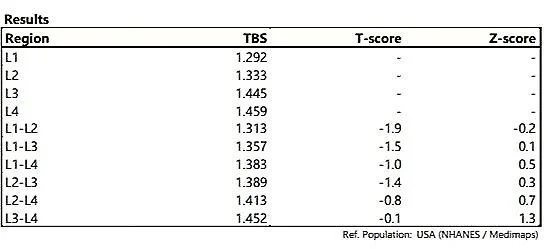What do the TBS numbers on my DEXA scan mean?
If you don’t know what your Trabecular Bone Scores are, you need to read this.
You may have noticed TBS numbers on your DEXA scan and wondered what they really meant. TBS stands for TRABECULAR BONE SCORE. And it is valuable information to have in addition to the T-scores you get on your DEXA report.
We have known for quite some time that the T-scores given on your DEXA don’t give us the whole picture of your bone health. Our knowledge of how bone ages is still being researched. The TBS is an additional measurement that can help assess the quality of our bones.
TBS numbers are showing up on more DEXA scans, which is good. The scores are calculated from the same measurements taken during your DEXA scan. Additional software is needed to calculate the scores.
What does the TBS measure?
The TBS measures the inner bone quality. The scores tell you how your inner bone, the trabecular bone, is connected. This differs from a T-score, which measures your bone density, or the quantity.
You will most likely see a list, like the one below, when you see your TBS scores on your report.
A DEXA scan may include a table with a list of the area/region being measured, the TBS number, and the corresponding T-score and Z-score.
The scores typically do not have a reference, so you can use the following numbers to determine where your numbers align.
If your TBS numbers are all above 1.357, your TBS score will be considered of good quality. Your future fracture risk is therefore reduced.
If your TBS numbers are below 1.287, your future risk of fracture will increase.
Here's the thing:
You can have T-scores that place you in the osteopenia or osteoporosis range, but have normal or good TBS scores. The two measurements, T-scores and TBS scores, are independent of one another. You need to look at both to get a more complete picture of your bone health.
One more piece of information: Not all DEXA reports have a TBS.
When scheduling your next DEXA scan, be sure to ask if you will also receive a TBS measurement.
If they say they don't provide this score, try to schedule your DEXA scan at a different location. It is really good information to have.
Once again, here is a quick summary:
DEXA Scan and T-scores → Measures Bone Mineral Density (BMD)
TBS → Assesses Bone Quality & Strength 💡
A normal T-score doesn’t always mean strong bones—TBS fills in the missing details! 💯 If you're in the osteopenia range, the TBS numbers can help determine your actual fracture risk.
I hope you have found this helpful. I go over this and so much more with my Strong Women, Strong Bones members. Be sure to get on the waitlist for my next cohort here. I look forward to helping you stay strong for years to come.
Next, I will discuss the FRAX tool and its use to help assess fracture risk.


